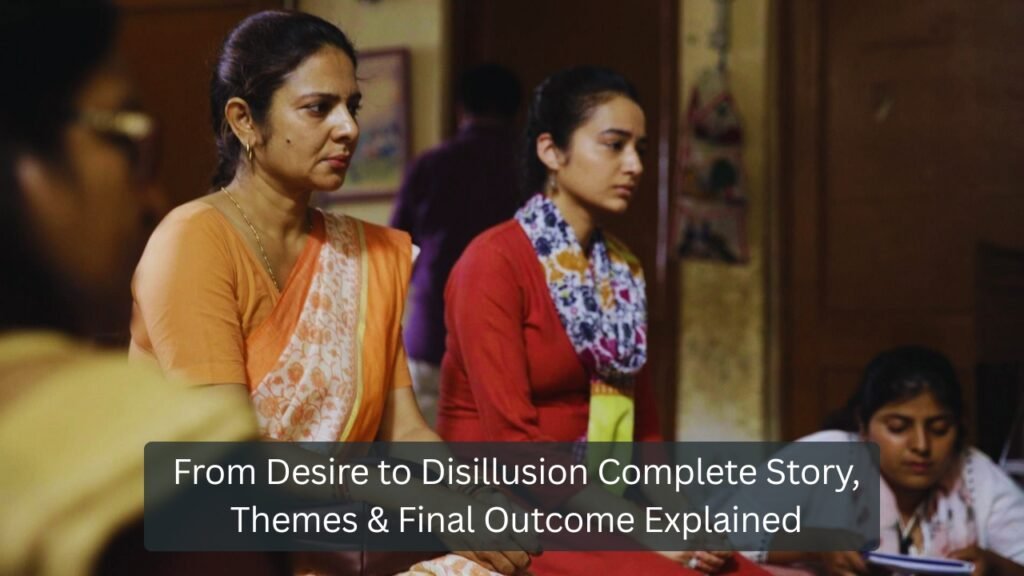Indian cinema has long explored the complexities of relationships, desire, society, and sexuality, but Agra stands out for the way it blends all these elements into a story that feels raw, startlingly intimate, and unapologetically real. Directed by Kanu Behl, the Agra Movie Review is not just about people living in a cramped house in the lanes of Agra it is about the suffocation, loneliness, fantasies, and emotional deprivation that exist inside the human mind.
In this Agra Movie Review, we dive deep into its story, characters, symbolism, performances, and the brutally honest final message that the Agra Movie Review leaves behind. Far away from commercial gloss and Agra Movie Review melodrama, Agra is a difficult watch but it is also a powerful one.
Story – A House Filled With People, Yet Everyone Is Alone
The story follows Guru, a young man living with his family in an old, congested house in Agra. The house becomes a metaphor for his inner world divided rooms, closed doors, secrets, and desires that have no outlet.
Guru works at a call center and appears normal to the outside world, but within the cramped walls of his home, he is struggling with repressed sexuality, frustration, and emotional hunger. He feels ignored, unheard, and invisible. The women in his life mother, love interest, stepmother, and others each represent a different layer of his inner conflict.
His father, long separated from his mother, lives in another part of the same house but remains emotionally absent. The father is building new rooms and floors on top of the house, as if endlessly constructing a future that never arrives. Guru watches this physical construction just as he watches his emotional world collapse.
As the Agra Movie Review progresses:
- Guru distances himself more and more from reality.
His fantasies begin mixing with real life.
His frustrations explode into emotional outbursts.
- The house becomes a battleground for identity, recognition, and desire.
This makes Agra not just the name of a city but the name of a life spent building walls inside the mind.
Characters – Flawed, Real, and Painfully Human
Guru
Guru is not a hero. He is not even a traditional protagonist. He is a young man who simply wants to be seen, loved, acknowledged, and understood needs that many people take for granted.
He tries to find love, but every door in his life leads only to:
misunderstanding
humiliation
rejection
or emotional silence
His spiral into fantasy is not sudden it is a result of years of emotional starvation.
Guru’s Parents
His parents are not villains. They are just people who failed each other, and in the process, failed him.
- The father, living in physical proximity but emotional distance, represents indifference.
- The mother, trapped in her own disappointments, rarely sees the depth of Guru’s despair.
The Agra Movie Review never blames them it simply shows how generations can inherit emotional damage without even noticing.
Other Women in Guru’s Life
The women Guru is attracted to are:
- Real
- Independent
- Flawed
- And carrying their own emotional wounds
But Guru sees them only through the lens of his need that becomes his downfall.
His fantasy versions of them are soft, loving, and welcoming.
The real versions are complex, unavailable, or uninterested.
This difference between what he dreams of and what the world really is becomes the core tension of the story.
Symbolism – The House Is the Real Character
If you pay attention, the house in Agra is the real protagonist. Every wall, room, stair, and window has meaning.
- The unfinished floors represent unfinished emotional growth.
- The locked rooms represent secrets no one talks about.
- The narrow hallways reflect the lack of emotional space in their lives.
- The constant construction symbolizes false hope the belief that “things will get better later,” even when nothing actually changes.
It is a brilliant artistic choice without a word said, the house narrates the story of every family member.
Themes – Desire, Silence, Loneliness & the Journey Into the Mind
1. The Cost of Emotional Starvation
Guru represents countless people whose mental struggles come not from trauma alone, but from:
lack of attention
lack of expression
lack of emotional nourishment
The Agra Movie Review is not asking us to judge him. It is asking us to understand where loneliness leads when no one listens.
2. Sexuality Without Expression
The movie deals with sexual frustration honestly without glamour, without comedy, and without shame.
In Indian society, where emotional conversations rarely happen:
Sexuality becomes a place where many people seek identity, power, or validation.
Guru is neither a monster nor a pervert he is a young man who never learned how to navigate desire in a healthy way.
3. Reality vs. Fantasy
One of the strongest layers of the Agra Movie Review is how seamlessly fantasy blends with reality.
Sometimes:
Guru imagines conversations that never happen.
He sees expressions that people did not make.
He believes something is real simply because he needs it to be.
This is how isolation works the mind begins building a world that feels safer than the real one.
4. The Cycle of Dysfunction
Every character is stuck:
Parents stuck in a loveless life
Son stuck in loneliness
Relationships stuck in silence
Nothing changes because nobody talks.
And silence becomes their shared prison.

Performances – Honest, Raw & Deeply Affecting
The Agra Movie Review cast deserves enormous credit. In a movie where emotions are subtle and internal, the performances elevate everything.
Mohit Agarwal as Guru
Mohit delivers a brave, vulnerable, and unfiltered performance. He does not “act” loneliness — he inhabits it. His eyes communicate things his character never says aloud.
Supporting Cast
The actors playing the family members and women in Guru’s life add authenticity:
They never become caricatures.
They never overact.
They perform with restraint and honesty.
Every character feels like someone we could meet in real life and that realism is both unsettling and impactful.
Direction – Kanu Behl Holds Nothing Back
Kanu Behl is known for creating stories that are raw, uncomfortable, and grounded in brutal truth. With Agra, he pushes that even further.
His direction is:
patient
observant
non-judgmental
courageous
He does not explain everything to the audience. He trusts viewers to understand emotions through:
silence
body language
incomplete conversations
and subtext
This approach gives the Agra Movie Review a psychological and artistic weight rarely seen in mainstream Indian cinema.
Ending – No Comfort, Only Truth
The Agra Movie Review does not offer a happy ending. It does not wrap everything neatly.
Why?
Because lives like these do not get instant solutions.
They only get realization.
Guru confronts a truth:
No fantasy can replace human connection.
No one becomes whole in isolation.
Silence destroys as much as violence does.
The ending stays with you long after the credits roll.
Strengths
Powerful, meaningful storytelling
Deep psychological character study
Outstanding central performance
Symbolism that enriches the narrative
Honest portrayal of sexuality and loneliness
Direction that respects the audience’s intelligence
Weaknesses
For some viewers:
The pacing may feel slow
The story may feel heavy or emotionally draining
The lack of spoon-feeding may make it harder to follow
The sexual themes may make conservative audiences uncomfortable
But none of these are flaws they reflect the kind of Agra Movie Review Agra wants to be.
Final Verdict – A Bold, Unflinching Look at the Human Mind
This Agra Movie Review concludes that the Agra Movie Review is not made to entertain it is made to hold up a mirror.
It asks:
What happens when people live together but never connect?
What happens when emotions dry out before bodies grow up?
What happens when loneliness becomes louder than love?
Agra is not a Agra Movie Review everyone will enjoy but it is a Agra Movie Review everyone should experience. It is bold, thought-provoking, uncomfortable, and deeply human.




